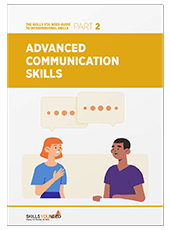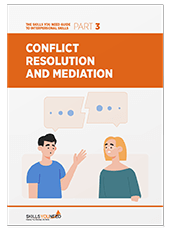Negotiation and Persuasion Skills
See also: Conflict Resolution and MediationFrom time-to-time, whenever people are together, conflict and disagreement are bound to arise. People have different needs, wants, aims and beliefs and sometimes they clash.
Negotiation is a process that can be used to address and resolve disagreements between people, and find common ground.
Without negotiation, such conflicts may lead to argument and resentment resulting in one or all of the parties feeling dissatisfied. The point of negotiation is to try to reach agreements without causing future barriers to communications.
Working together
‘Old style’ negotiation involved trying to ‘win’, usually through a process that established ‘common ground’ where both sides gave something without going below their ‘bottom line’.
More recently, negotiating styles have changed, with a recognition that working together to find a really good solution may be better for both parties.
Understanding Negotiation
Our negotiation pages are designed to help you understand the process of negotiation, and how to negotiate successfully. They will also help you understand the importance of good communication, and why a win-win approach is likely to be more successful than other approaches in negotiation.
Negotiation does not always have to be formal, but it can help if you follow a similar set of stages through any negotiation process.
Our page on What is Negotiation? explains these stages.
It also discusses the importance of attitudes, knowledge and interpersonal skills in conducting a successful negotiation.
There are a number of different approaches to negotiation. The two main options are win-lose, or haggling, and win-win negotiation.
Our page: Negotiation in Action explains how both methods operate, and gives some examples of how they might work in practice. It also offers some ideas for how to find a win-win solution, and why this is important.
Transactional Analysis is a psychological technique popularised by Dr Thomas Harris in his book ‘I’m OK, You’re OK’.
Transactional analysis is a useful support to understanding why win-win negotiation is more likely to be successful.
Our page on Transactional Analysis explains more about the science behind the technique, and how to use it in your dealings with others.
As in any communication process, it is possible for misunderstandings to arise in negotiations, and they are a common reason for negotiations to break down.
Our page, Avoiding Misunderstandings in Negotiations explains more about how misunderstandings can arise, and the most important interpersonal skills required to avoid and overcome them.
The phrase ‘peer negotiation’ is a term used for peer-to-peer negotiation, often among young people, although it can also be used successfully in the workplace or in a voluntary position.
The idea is to use the skills required for formal negotiations to resolve difficulties between individuals before they become serious conflicts.
Our page on Peer Negotiation explains more about the skills needed to do so.
A key part of being able to negotiate successfully is to be able to persuade and influence others.
Developing a win-win solution involves far more than simply putting an offer on the table and waiting for the other side to respond. Being able to advocate successfully for your suggestion, and persuade others of its merits, are key.
Our page Persuasion and Influencing Skills explains how you can develop the skills needed to do so.
Negotiation, Conflict and Mediation
Many interpersonal skills are very closely connected.
Negotiation skills are perhaps particularly closely interwoven with conflict resolution and mediation skills. If your negotiation fails, for example, you may need to call upon conflict resolution skills. If you are trying to resolve a conflict situation, you are quite likely to find that you are using negotiation techniques, and particularly the techniques connected with trying to find a win-win solution.
Before embarking on a negotiation, therefore, you may like to read some of our section on Conflict Resolution and Mediation.
Further Reading from Skills You Need
Conflict Resolution and Mediation
Learn more about how to effectively resolve conflict and mediate personal relationships at home, at work and socially.
Our eBooks are ideal for anyone who wants to learn about or develop their interpersonal skills and are full of easy-to-follow, practical information.
Formal or Informal Skills?
Negotiation skills, like conflict resolution and mediation skills, are not just for international statesmen, or even union officials.
Negotiation skills can be useful for many situations at home and at work, such as agreeing the time by which your teenager needs to be home, or discussing who will sit where in a new office.
The crucial issue is to strive for and negotiate towards a win-win solution: one that gives something to everyone, and hopefully provides a better result together than anyone would have obtained on their own.


